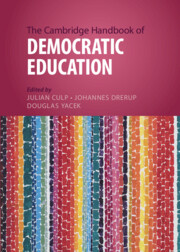Book contents
- The Cambridge Handbook of Democratic Education
- Cambridge Handbooks in Education
- The Cambridge Handbook of Democratic Education
- Copyright page
- Contents
- Contributors
- Acknowledgments
- Introduction
- Part One Historical Perspectives
- Part Two Philosophical and Normative Foundations
- Part Three Key Topics and Concepts
- Part Four Challenges
- 26 Wealth Stratification in US Higher Education and Democratic Education, 1890s–2020s
- 27 Mentoring and Instructional Duties of Professors
- 28 Racism, Moral Transformation, and Democratic Education
- 29 Postcolonial Perspectives on Democratic Education
- 30 Populist Challenges to Democratic Education
- 31 Religion and Democratic Education
- 32 The Epistocratic Challenge to Democratic Education
- 33 Climate Change and Democratic Education
- 34 The COVID-19 Pandemic and Democratic Education
- 35 Teacher Neutrality, Pedagogical Impartiality, and Democratic Education
- Index
- References
33 - Climate Change and Democratic Education
from Part Four - Challenges
Published online by Cambridge University Press: 20 April 2023
- The Cambridge Handbook of Democratic Education
- Cambridge Handbooks in Education
- The Cambridge Handbook of Democratic Education
- Copyright page
- Contents
- Contributors
- Acknowledgments
- Introduction
- Part One Historical Perspectives
- Part Two Philosophical and Normative Foundations
- Part Three Key Topics and Concepts
- Part Four Challenges
- 26 Wealth Stratification in US Higher Education and Democratic Education, 1890s–2020s
- 27 Mentoring and Instructional Duties of Professors
- 28 Racism, Moral Transformation, and Democratic Education
- 29 Postcolonial Perspectives on Democratic Education
- 30 Populist Challenges to Democratic Education
- 31 Religion and Democratic Education
- 32 The Epistocratic Challenge to Democratic Education
- 33 Climate Change and Democratic Education
- 34 The COVID-19 Pandemic and Democratic Education
- 35 Teacher Neutrality, Pedagogical Impartiality, and Democratic Education
- Index
- References
Summary
This chapter analyzes the advantages and disadvantages of democracies over nondemocracies when it comes to responding adequately to climate change in order to reflect on their implications for democratic education, understood as an ideal of education in which those educated come to a personal, informed awareness of the nature of political reality and a personal and informed understanding and assessment of the value of the two main components of the ideal of democracy: popular sovereignty and the recognition of human beings’ fundamental equality. The chapter offers three conclusions. First, we have reason to invest in democratic education – not just climate education. Second, radical (or agonistic) democratic education can be considered an important corrective and supplement to other approaches. Third, the primary value of democratic education, in the face of climate change, lies in responsibilizing students – fostering serious personal engagement with the issue.
Keywords
- Type
- Chapter
- Information
- The Cambridge Handbook of Democratic Education , pp. 574 - 593Publisher: Cambridge University PressPrint publication year: 2023

